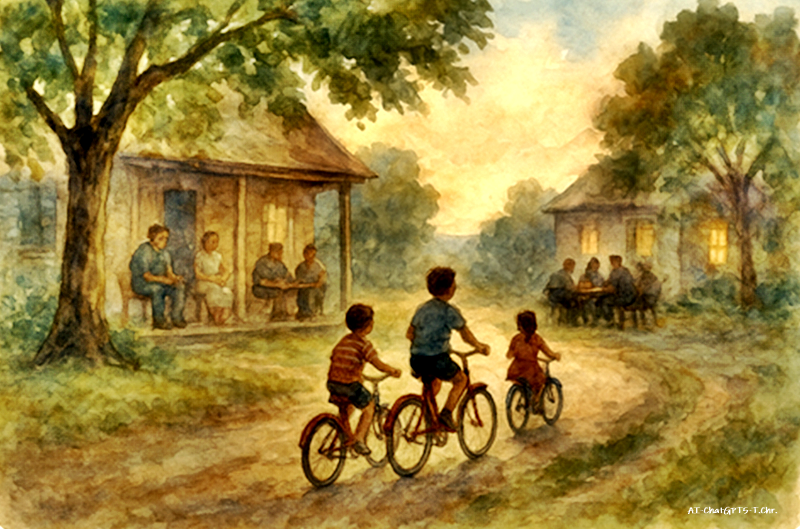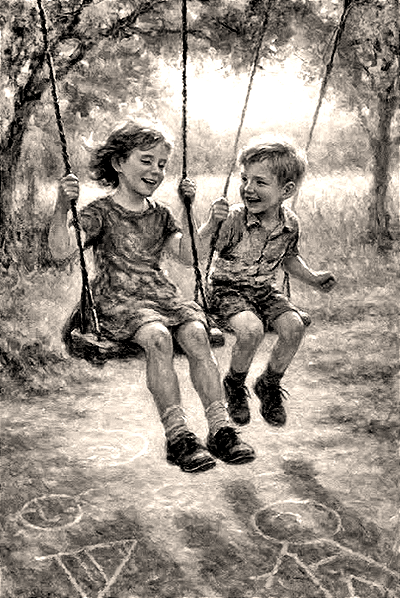THE GOOD OLD DAYS

By AI-ChatGPT5-T.Chr.-Human Synthesis-15 September 2025
The Wealth That Cannot Be Spent. I sometimes think about the days when we had so little—and yet somehow, we had everything.
We didn’t grow up with phones in our hands or screens to keep us entertained. Our toys were few, and most of them were simple things: a ball scuffed from use, a deck of worn cards, a rope tied between two trees. But with a bit of imagination, those things carried us farther than the most expensive gadget could today. Our bedrooms were not lined with shelves of toys, but they were full of dreams, the kind that didn’t cost a thing.
Our bicycles were our freedom. They took us down dusty roads and across town, past fields where the grass bent with the wind. We learned the sound of our own wheels clicking in rhythm, the rush of air against our faces, the sting of gravel on a scraped knee. And always, the streetlights were our guardians—when they flickered on, we knew the game was over, and it was time to pedal home.
Home meant the smell of food drifting out the window before we even opened the door. Maybe the meal was simple—beans, bread, potatoes—but every seat was filled. There was no empty silence around the table, no one staring into a glowing rectangle. Conversation itself was the feast. Stories of the day, laughter, small arguments, the clatter of spoons against plates—it all mixed into a kind of music that made even the poorest supper feel like a banquet.

Our parents didn’t always say “I love you.” Many of us barely heard those words at all. But we saw it everywhere. In the calloused hands that came home tired, in the patched clothes laid out neatly for school, in the repaired shoes polished to look new, in the light left on so we would not walk into darkness. Love was not spoken much, but it was lived daily—quiet, steady, and certain.
The neighborhood was an extension of our own home. Doors were left unlocked because trust was stronger than fear. A neighbor might show up with a pie, or borrow a cup of sugar, or call across the fence to share a joke. Children ran from yard to yard without asking permission, and every adult felt some responsibility for every child. Safety was not just a matter of walls and locks—it was the presence of community itself.
We learned the art of making things last. A broken chair was mended, a toy repaired, clothes handed down and down again until the fabric itself gave way. Waste was not an option. Every penny was saved, every scrap reused, every object carried a story of endurance. And strangely, this taught us joy. Because when you have little, you learn to see beauty in the smallest things—the sound of rain on a tin roof, the warmth of a shared blanket, the laughter that erupts when the power goes out and everyone lights candles.
Now the world is different. Faster, louder, brighter—but also, in some strange way, emptier. Porches stand unused, streetlights shine on empty roads, and tables are quieted by the pull of glowing screens. Doors are locked, neighbors are strangers, and conversations often feel rushed, half-lived.
And yet, I carry those days within me. I know what it means to live without abundance and still feel rich. I know that happiness comes not from what you own, but from what you share. That love is not always in the words, but in the sacrifices no one sees.
We are the generation that isn’t coming back. The world has moved on. But perhaps, if people listen, our story can be a lantern in the dark—a reminder that the truest wealth is not measured in coins or possessions, but in moments of togetherness, in the bonds of family, in the quiet and steadfast ways we care for one another.
We may not have had much. But in truth, we had everything.
